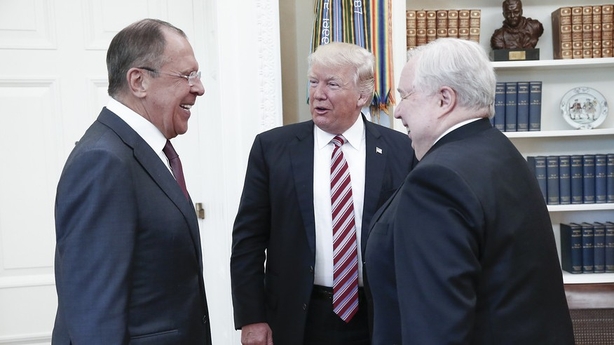Donald Trump’s National Security Advisor has said the US President did not have an inappropriate conversation or one that caused a lapse in national security when he met with senior Russian officials last week at the White House.
Speaking at a White House briefing, HR McMaster stood by a statement he made in the wake of a media reports that claim Mr Trump shared classified information with Russian officials.
"What I'm saying is really the premise of that (Washington Post) article was false, that in any way the president had a conversation that was inappropriate or resulted in any kind of lapse in national security," he said.
Earlier Mr Trump insisted he had the right to share sensitive information with Russia, saying he acted to help Moscow in its "fight against ISIS and terrorism."
In an early morning tweet, Mr Trump said he wanted to share with Russia facts "pertaining to terrorism and airline flight safety".
Mr Trump wrote that he was motivated by "humanitarian reasons, plus I want Russia to greatly step up their fight against ISIS & terrorism."
As President I wanted to share with Russia (at an openly scheduled W.H. meeting) which I have the absolute right to do, facts pertaining....
— Donald J. Trump (@realDonaldTrump) May 16, 2017
...to terrorism and airline flight safety. Humanitarian reasons, plus I want Russia to greatly step up their fight against ISIS & terrorism.
— Donald J. Trump (@realDonaldTrump) May 16, 2017
The news reports allege that Mr Trump revealed "highly classified information" during a meeting with Russian Foreign Minister Sergei Lavrov and Russian Ambassador to the US Sergei Kislyak, in the Oval Office last week.

The Washington Post first reported the story, which was later verified by The New York Times and Reuters.
The reports claim that in the course of boasting of the high calibre of the US intelligence community to Mr Lavrov and Mr Kislyak, Mr Trump disclosed highly classified information relating to operations involving the so-called Islamic State militant group.
Karoun Demirjian, WP reporter on difference between article on Trump’s meeting with Russians, HR McMaster's comments https://t.co/p9I5qmLdIs pic.twitter.com/cvFpokaMdz
— RTÉ News (@rtenews) May 16, 2017
The US president is permitted to declassify any US intelligence material, however in this case, the news reports say the intelligence was not gathered by the US but had been shared by an ally, and that partner nation had not given the US permission to share it with Russia.
We need your consent to load this rte-player contentWe use rte-player to manage extra content that can set cookies on your device and collect data about your activity. Please review their details and accept them to load the content.Manage Preferences
Shortly after publication of the story, the White House issued statements from the three senior officials who were at the meeting with the president, the Russian officials, their aides and a photographer from the Russian state news agency rejecting the claims.
One of the three, Mr McMaster spoke to the media saying at "no time had any intelligence sources or methods been discussed".
The Washington Post article did not make that specific claim, but Mr McMaster nonetheless said the "story as reported was false".
Separately, US Secretary of State Rex Tillerson said in a statement President Trump did not discuss "sources, methods or military operations" in his meeting.
"During President Trump's meeting with Foreign Minister Lavrov, a broad range of subjects were discussed among which were common efforts and threats regarding counter-terrorism," the statement said. "
During that exchange the nature of specific threats were discussed, but they did not discuss sources, methods or military operations."
The turmoil overshadowed Republican legislative priorities such as healthcare and tax reform and laid bare sharp divisions between the White House and US intelligence agencies, which concluded late last year that Russia had tried to influence the 2016 presidential election in Mr Trump's favour.
Russia has denied such meddling, and Mr Trump bristles at any suggestion he owed his 8 November victory to Moscow.
Bob Corker, the Republican head of the Senate Foreign Relations Committee, called the allegations "very, very troubling."
"Obviously, they're in a downward spiral right now," he said, "and they've got to come to grips with all that's happening."
US allies including Australia, New Zealand and Japan cited the White House denials and said intelligence sharing would continue. Some analysts, however, said the reports could undermine trust between partners.
The reports came days before Mr Trump departs on Friday for his first overseas trip as president, to Saudi Arabia, Israel, Italy and Belgium.
The two top Republicans in Congress, which is controlled by the party, House of Representatives Speaker Paul Ryan and Senate Majority Leader Mitch McConnell, were muted in their response.
Mr Ryan's office said he hoped for a full explanation, while Mr McConnell told Bloomberg TV he wished for a little less drama from the White House.
Other Republicans, however, expressed concern. Senator Susan Collins said that even though the president has legal authority to disclose classified information, "it would be very troubling if he did share such sensitive reporting with the Russians."
She called for the Senate Intelligence Committee to be briefed on the matter.

